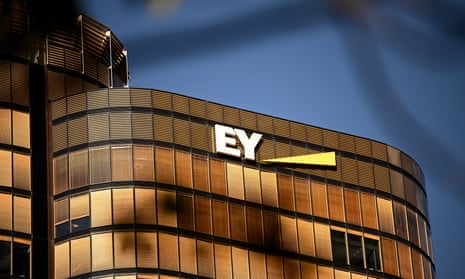Consultancy firm EY Oceania was supporting the oil and gas industry’s lobbying efforts while being paid by the federal government for independent advice on its signature climate policy and gas emissions.
The firm, which is a member of the oil and gas lobby and audits Santos, insists there was no conflict of interest between its work for industry and government. But a bipartisan group of politicians and transparency advocates is not convinced and has demanded more information.
In late October, EY Oceania was hired by Australian Energy Producers (AEP) to publish a report on the future of the gas industry. The 27 November report called for “ongoing investment in gas supply” and warned against a rapid transition away from gas.
EY Oceania was also hired to support AEP – formerly known as the Australian Petroleum Production & Exploration Association – and prepare a submission outlining concerns about the government’s future gas strategy, which was being developed by the industry department. The submission, also submitted on 27 November, frequently cited EY’s analysis and conclusions.
While EY was working for AEP, it was also contracted by the Department of Climate Change, Energy, the Environment and Water (DCCEEW) to provide “analysis and advice on emission outputs for oil and gas facilities”, “analysis and advice under the safeguard mechanism” and “professional advice on market modelling services electricity”. These contracts were worth $510,000, according to government records.
The Albanese government’s safeguard mechanism aims to limit emissions from the country’s biggest industrial sites. This would impact many AEP members including Santos. EY did not tell the government it was a member of the AEP.
“There is no overlap of subject matter nor is there a risk of one EY team reviewing the work of another EY team,” the spokesperson said.
“When a conflict of interest exists, or arises during an engagement, we will disclose this to the client, which may result in EY declining to act, as required by professional standards.”
Despite claiming there was no conflict of interest, EY was required to sign a non-disclosure agreement while working on the safeguard mechanism and to submit written assurances about how internal conflicts would be managed with regard to staff and other engagements.
Greens MP Abigail Boyd, who is leading a NSW parliamentary inquiry into the consulting industry, was not convinced by EY’s assurances and said she would seek more detail when EY appears before the inquiry next month.
“Once again we have a consulting firm deploying a farcically narrow and self-serving definition of conflict of interest that simply doesn’t pass the pub test,” Boyd said.
“I’m putting EY on notice that I fully intend to interrogate this issue. The implications for government and public policy in this space are too grave for this issue to go un-interrogated.”
Labor senator Deborah O’Neill, who is a member of a federal inquiry into the industry, said she was concerned by firms advising government on policies that would affect the profitability of their private sector clients.
after newsletter promotion
The chief executive of Transparency International, Clancy Moore, said there was “clearly a potential conflict of interest in this case”.
“It’s not a good look to have the government paying hundreds of thousands of dollars to a consultancy firm for independent advice on the oil and gas industry while the same firm is also on the payroll of the oil and gas industry,” Moore said.
“We would expect EY to have disclosed the conflict of interest and explained how they managed the conflict of interest to relevant stakeholders including the government.”
Doctors for the Environment Australia, a group of medical professionals who lobby the government on climate change, said EY should not have been hired by the department.
“It is deeply troubling that our government engages a consultancy firm to advise on mechanisms touted to reduce our reliance on gas when that same firm is also employed by the gas industry to provide advice on its ongoing expansion,” said the group’s executive director, Dr Kate Wylie.
A DCCEEW spokesperson said it hired EY “to provide specialist services and capability that that were not available in the department”.
Independent ACT senator David Pocock said there was “clear scope here for a serious conflict of interest” given EY’s taxpayer-funded contracts and “the work they were being paid for by the oil and gas lobby”.
